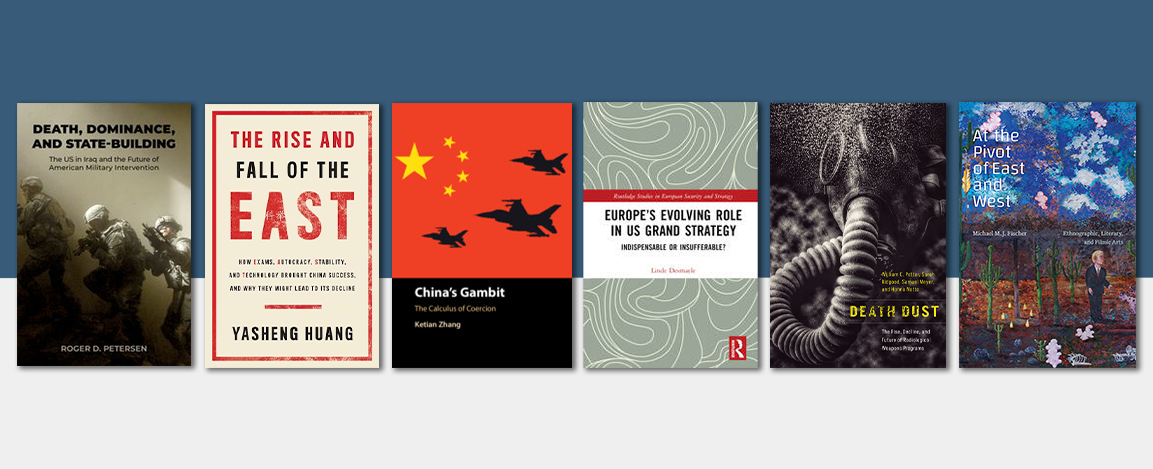The latest releases from the Center’s faculty, fellows, and scholars are featured below. An archive of CIS books is available here.
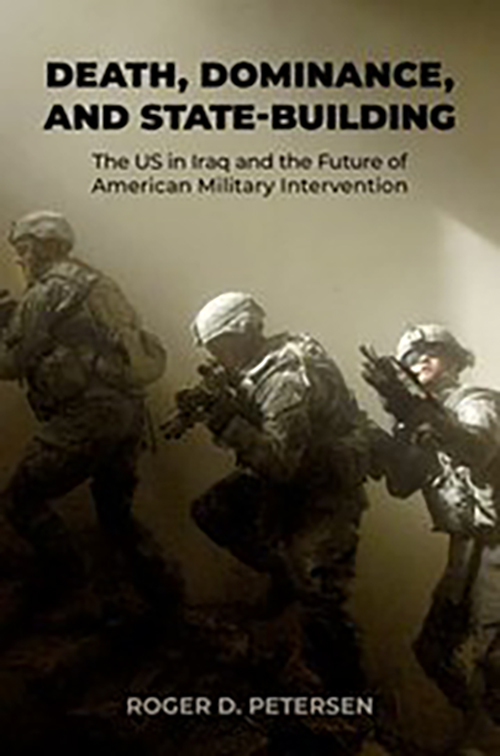
Death, Dominance, and State-Building: The US in Iraq and the Future of American Military Intervention (Oxford University Press)
Roger Petersen, the Arthur and Ruth Sloan Professor of Political Science, provides the first comprehensive analytic history of post-invasion Iraq. Although the war is almost universally derided as one of the biggest foreign policy blunders of the post-Cold War era, Petersen argues that the course and conduct of the conflict is poorly understood. He begins by outlining an accessible framework for analyzing complex, fluid, and violent internal conflicts. He then applies that framework to a variety of diverse case studies to break down the strategic interplay among the US military forces and Shia and Sunni insurgent organizations as it played out in Baghdad, Anbar, and Hawija. Highlighting the struggle for dominance between Shia and Sunni in Baghdad, Petersen offers a reconsideration of the Surge. He also addresses failures of state-building in Iraqi Kurdistan. Critically, he shows how the legacy of the US occupation and presence from 2003-2011 shaped Iraq's political and security contours from 2011-2023. Comprehensive, analytically sophisticated, and subtle, this book draws lessons relevant to future American military interventions from what most regard as the US's most disastrous foreign policy adventure since Vietnam. The US cannot simply wish away insurgencies, which are always going to occur. The question is what the US and other great powers might do about them in the future.
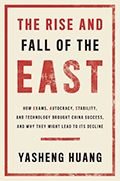 The Rise and Fall of the EAST: How Exams, Autocracy, Stability, and Technology Brought China Success, and Why They Might Lead to its Decline (Yale University Press)
The Rise and Fall of the EAST: How Exams, Autocracy, Stability, and Technology Brought China Success, and Why They Might Lead to its Decline (Yale University Press)
Yasheng Huang, the faculty director of the MIT-China Program and the Epoch Foundation Professorship of Global Economics and Management at MIT Sloan School of Management, explores how Chinese society has been shaped by the interplay of the EAST—exams, autocracy, stability, and technology—from ancient times through the present. Beginning with the Sui dynasty's introduction of the civil service exam, known as Keju, in 587 CE—and continuing through the personnel management system used by the Chinese Communist Party (CCP)—Chinese autocracies have developed exceptional tools for homogenizing ideas, norms, and practices. But this uniformity came with a huge downside: stifled creativity. Huang shows how China transitioned from dynamism to extreme stagnation after the Kejuwas instituted. China's most prosperous periods, such as during the Tang dynasty (618-907) and under the reformist CCP, occurred when its emphasis on scale (the size of bureaucracy) was balanced with scope (diversity of ideas). Considering China's remarkable success over the past half-century, Huang sees signs of danger in the political and economic reversals under Xi Jinping. The CCP has again vaulted conformity above new ideas, reverting to the Keju model that eventually led to technological decline. It is a lesson from China's own history, Huang argues, that Chinese leaders would be wise to take seriously.
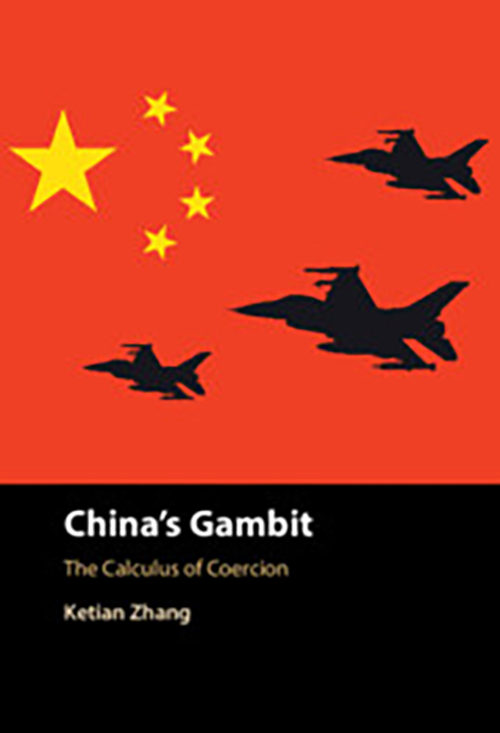 China's Gambit: The Calculus of Coercion (Cambridge University Press)
China's Gambit: The Calculus of Coercion (Cambridge University Press)
Emerging from her award-winning article in International Security, China's Gambit examines when, why, and how China attempts to coerce states over perceived threats to its national security. Since 1990, China has used coercion for territorial disputes and issues related to Taiwan and Tibet, yet China is curiously selective in the timing, target, and tools of coercion. Ketian Zhang PhD ‘18 offers a new and generalizable cost-balancing theory to explain states' coercion decisions. It demonstrates that China does not coerce frequently and uses military coercion less when it becomes stronger, resorting primarily to non-militarized tools. Leveraging rich empirical evidence, including primary Chinese documents and interviews with Chinese and foreign officials, this book explains how contemporary rising powers translate their power into influence and offers a new framework for explaining states' coercion decisions in an era of economic interdependence, particularly how contemporary global economic interdependence affects rising powers' foreign security policies.
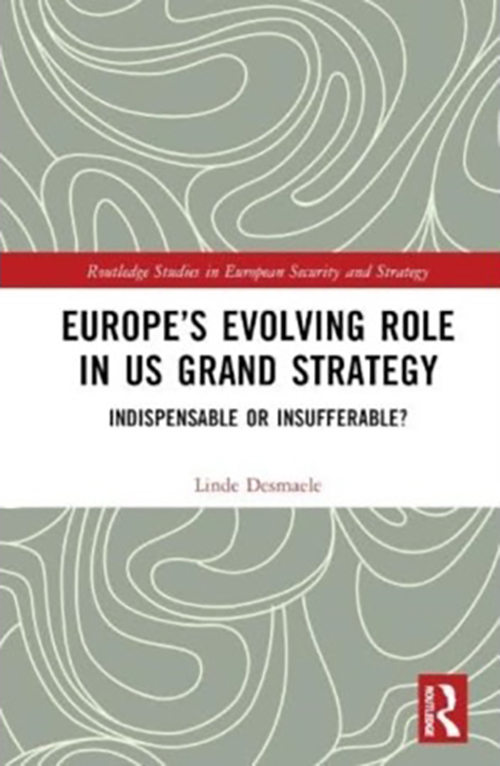 Europe’s Evolving Role in US Grand Strategy: Indispensable or Insufferable? (Routledge)
Europe’s Evolving Role in US Grand Strategy: Indispensable or Insufferable? (Routledge)
Linde Desmaele, a post-doctoral researcher in the MIT Security Studies Program (SSP), looks at the evolution of the role of Europe in US grand strategy, and unpacks how US administrations have instrumentalized this relationship in pursuit of extra-European objectives. The work considers geopolitical pressures in conjunction with leaders’ strategic ideas to provide an account of the evolution of the role of Europe in the context of US grand strategy. Observers generally agree on the vague notion that Europe has been de-prioritized in Washington’s external affairs. Against this background, the book makes the case that such de-prioritization of Europe in the context of US grand strategy also entails a reconceptualization of the transatlantic relationship, namely as a region featuring long-standing relationships that can at times be leveraged in pursuit of non-European goals. The United States has a long history of seeking European support or acquiescence for its role as the leader of the international system, but whereas during the Cold War Washington enlisted its European allies in a grand strategic struggle against a European power, more recently, it has sought to enlist European allies in extra-European struggles of different types. Thinking about the role of Europe in US grand strategy now requires new theoretical and empirical tools that allow for the recognition of this very fact. Accordingly, this book proposes that strategic ideas on the viability of international cooperation held within the White House crucially shape what—if any—type of support the United States seeks from Europe on the global stage. In doing so, the book adds important nuance to other accounts proclaiming either the proverbial death of the transatlantic relationship or the eternal and unchanging nature thereof.
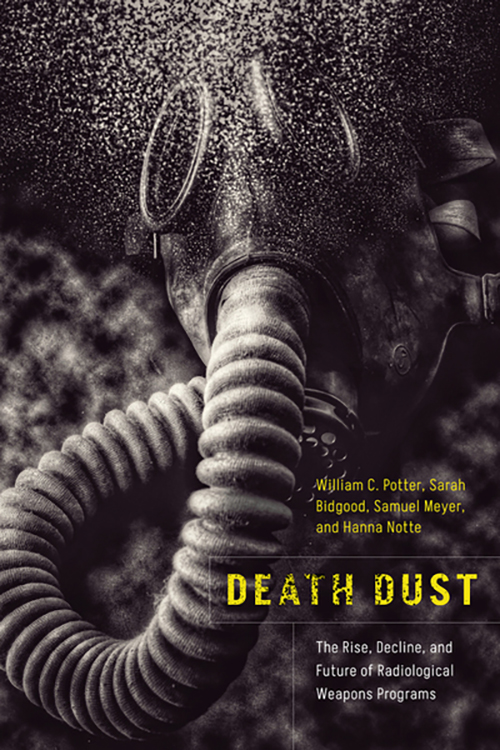 Death Dust: The Rise, Decline, and Future of Radiological Weapons Programs (Stanford University Press)
Death Dust: The Rise, Decline, and Future of Radiological Weapons Programs (Stanford University Press)
Sarah Bidgood, a Stanton Nuclear Security Fellow at SSP, published her new book with William C. Potter, Samuel Meyer, and Hanna Notte. Their book presents practical, necessary steps to reduce the likelihood of a resurgence of interest in and pursuit of radiological weapons by state actors. The postwar period saw increased interest in the idea of relatively easy-to-manufacture but devastatingly lethal radiological munitions whose use would not discriminate between civilian and military targets. Death Dust explores the largely unknown history of the development of radiological weapons (RW)—weapons designed to disperse radioactive material without a nuclear detonation—through a series of comparative case studies across the United States, the Soviet Union, the United Kingdom, Iraq, and Egypt. The authors illuminate the historical drivers of and impediments to radiological weapons innovation. They also examine how new, dire geopolitical events—such as the war in Ukraine—could encourage other states to pursue RW and analyze the impact of the spread of such weapons on nuclear deterrence and the nonproliferation regime. Death Dust presents practical, necessary steps to reduce the likelihood of a resurgence of interest in and pursuit of radiological weapons by state actors.
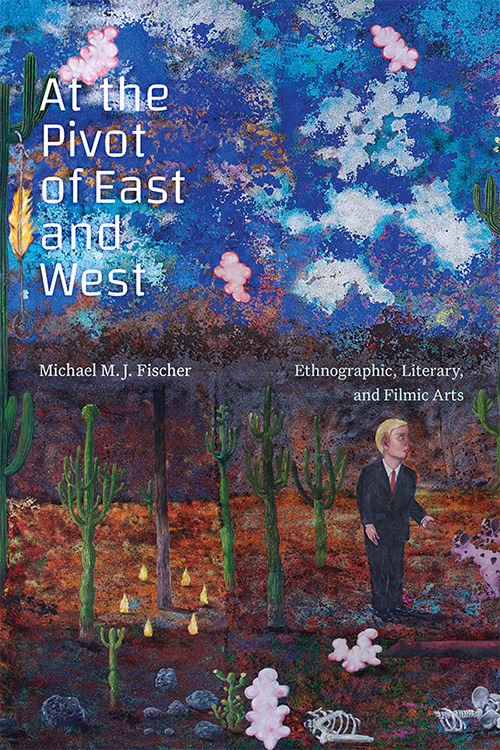 At the Pivot of East and West: Ethnographic, Literary, and Filmic Arts (Duke University Press)
At the Pivot of East and West: Ethnographic, Literary, and Filmic Arts (Duke University Press)
Michael MJ Fischer, a CIS research affiliate and the Andrew W. Mellon Professor in the Humanities, examines documentary filmmaking and literature from Southeast Asia and Singapore for their para-ethnographic insights into politics, culture, and aesthetics. Continuing his project of applying anthropological thinking to the creative arts, Fischer exemplifies how art and fiction trace the ways in which taken-for-granted common sense changes over time, speak to the transnational present, and track signals of the future before they surface in public awareness.



